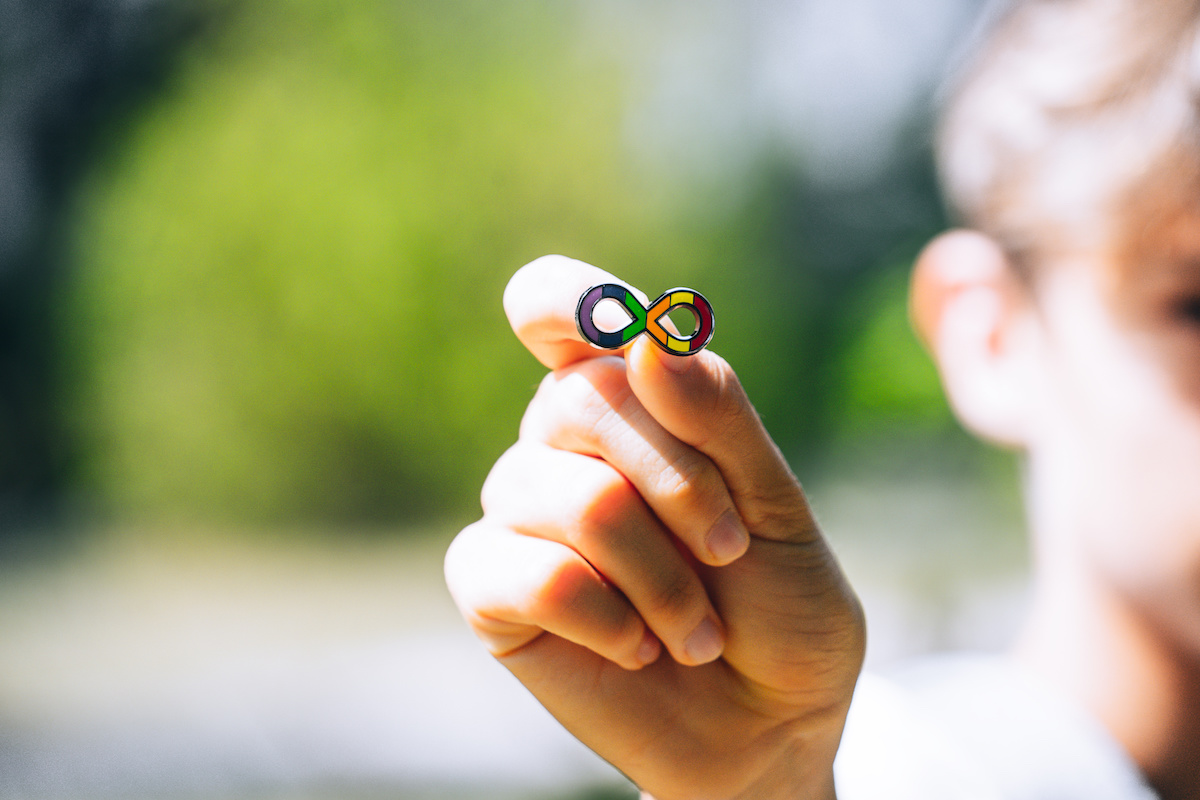By Sarah Thompson, LCPC and Catherine Pettit, LMSW
Your child is an extraordinary person with a unique neurotype. Our world thrives on diversity, which extends to how our brains perceive and experience the world. It is essential for you, as a loving parent, to understand and support your neurodivergent child on their journey. This blog post will explore strategies to help you embrace neurodiversity and provide the essential support your child needs.
Autism, ADHD, Dyslexia, and other experiences are not disorders that need to be fixed or cured but rather differences that contribute to the richness of the human experience. Embracing neurodiversity means creating inclusive environments that support the diverse needs and preferences of individuals with various neurotypes. It involves pushing against the neurotypical ideal and social norms to promote acceptance, understanding, and respect for neurodivergent people. In doing so, we can foster a society that values diversity in all its forms, promotes inclusivity, and embraces every individual’s inherent worth.
Understanding
As a parent, you hold the key to unlocking the best support for your child by educating yourself about their specific neurodivergent experience. Engage in a learning journey led by neurodivergent voices, including recent evidence-based books, research articles, podcasts, and trustworthy online resources. Please see a list of our carefully selected resources at the bottom of the article.
Attend workshops, seminars, or support groups dedicated to celebrating neurodiversity. The knowledge you gain will open doors to empathizing with your child’s experiences, recognizing their unique strengths, and identifying areas of vulnerability.
Testing
Neuropsychological testing plays a pivotal role in unraveling the mysteries of your child’s mind and understanding their individual strengths, challenges, and potential. It is a profoundly important tool that can provide clarity and insight into your child’s neurotype, offering a roadmap to their inner world. By undergoing a comprehensive assessment, your child can embark on a journey of self-discovery, where their unique cognitive and emotional landscape can be explored with utmost care and understanding. The testing process is tailored to be empathic, supportive, and respectful of your child’s needs, ensuring their comfort throughout the evaluation. By gaining a deeper understanding of your child’s neurodiversity, you can provide them with the support and resources they need to thrive. Neuropsychological testing can uncover their strengths, highlighting areas where they excel and highlighting their unique talents. Armed with this knowledge, you can nurture their strengths and provide tailored strategies to address any vulnerable areas they may face.
Connection
Building a foundation of trust begins with open and honest communication with your child. If they are learning about neurodiversity for the first time, some language that could assist in the conversation includes:
“It is important to know that everyone’s brain is wired differently, and that is what makes us all unique. Your neurodiversity is like having a superpower—a way of thinking and experiencing a truly unique world. It means you have amazing strengths and abilities that others may not have. Together, we will discover and celebrate these strengths. You may also face some challenges that others might not understand, but please know that we believe in your abilities to overcome them. We will work together as a team to find strategies and support to make your journey easier and ensure you have the resources you need to succeed”
This type of connection creates a safe and non-judgmental environment where they feel secure expressing their thoughts, feelings, and vulnerabilities. Be an active listener, remain fully present and engaged, validate their unique experiences, and offer reassurance. Through fostering open communication, you will forge a deep bond and strengthen your relationship, becoming their consistent and trusted ally.
Confidence
Within your child lies a treasury of unique strengths and talents waiting to be discovered. Encourage and nurture these gifts by providing opportunities for exploration and growth. Celebrate their achievements, no matter how small, and emphasize their strengths to boost their self-esteem and confidence. Helping your child uncover their passions and providing ample time for them to engage in these interests ignites their motivation and fosters a sense of accomplishment that will illuminate their path.
Uniqueness
Every neurodivergent child possesses an individual combination of strengths and differences. Their differences become challenges when they are in an environment that does not provide the appropriate support. Tailor your support strategies to meet your child’s specific needs. Collaborate with neurodiversity-affirming professionals, such as therapists, educators, and medical practitioners, to develop personalized plans and interventions. Implementing visual aids, schedules, or organizational tools can assist with executive functioning skills and empower their independence.
Independence
Empowering your child to become their own advocate is a priceless gift. Help your child understand their strengths, vulnerabilities, and rights. Encourage them to express their needs and preferences, advocate for accommodations, and communicate effectively with teachers, peers, and other adults. Developing self-advocacy skills will lay the foundation for their independence and growth throughout their journey.
Stability
Amid life’s unpredictability, neurodivergent individuals often thrive in environments where they know what to expect. Establishing routines and creating a sanctuary of predictability and stability can be essential. Consistency can alleviate anxiety and facilitate learning and growth. Designate quiet spaces and sensory-friendly areas where they can retreat when feeling overwhelmed. Set clear expectations and realistic goals, breaking tasks into manageable steps that lead to their ongoing success.
Belonging
Your child’s social interactions are vital for their growth and happiness. Foster inclusive environments that celebrate neurodiversity, embrace differences, and lead with acceptance. Facilitate opportunities for them to engage with peers with similar lived experiences. Connect with local groups, online communities, or organizations that cater to neurodivergent experiences. Encourage activities aligned with their interests, providing avenues for socialization and connection with others.
Parent Self-Care
Caring for a neurodivergent child can be a unique and, at times, an isolated experience. Remember to prioritize self-care, ensuring you have the energy and capacity to support your child effectively. Seek support from friends, family, or support groups that understand your child’s lived experience and yours as the parent. Take breaks and engage in activities that bring you joy and rejuvenation. And, if necessary, do not hesitate to seek professional help. Remember, you become an even better caregiver for your child by caring for yourself.
Conclusion
Supporting your neurodivergent child is a journey filled with understanding, empathy, and an unwavering commitment to embracing their remarkable strengths and vulnerabilities. Educating yourself, fostering open communication, individualizing support, and promoting self-advocacy will create an environment where your child can thrive. Your love, patience, and support are indispensable in shaping their journey toward a fulfilling and successful future. Let us embrace neurodiversity together and celebrate the extraordinary diversity of human experience.
Remember that each neurodivergent individual’s experience is unique, so exploring various resources to gain a broader understanding can be helpful. Additionally, engaging with local autistic and neurodiversity support groups or organizations can often provide valuable community-specific resources and support for neurodivergent children and their families.
Here is a list of recommended websites and books related to neurodivergent individuals and their experiences:
Websites:
- https://monadelahooke.com/: This website belongs to Mona Delahooke, a renowned clinical psychologist and author specializing in children’s mental health and neurodevelopmental disorders. Mona Delahooke’s website offers valuable resources, insights, and support for parents, caregivers, and professionals working with neurodiverse children.
- https://livesinthebalance.org/: Lives in the Balance is an organization founded by Dr. Ross Greene, a renowned clinical child psychologist, and author. The website promotes a compassionate, collaborative, non-punitive approach to understanding and supporting children with behavioral challenges, including those with neurodivergent experiences.
- https://www.pandasonline.org/: NeuroBears is a course all about the autistic experience. It was created for families to view with their children (ages 8-14) to expand their understanding of autism.
- https://ausometraining.com/: Ausome Training is a website that provides training and resources for parents and professionals who work with autistics
- https://notanautismmom.com/2020/07/20/autism-books/: “Not an Autism Mom” is a blog written by an autistic advocate and parent who shares personal experiences and insights related to autistics.
Books:
- “Unmasking Autism” by Devon Price, PhD
- “NeuroTribes: The Legacy of Autism and the Future of Neurodiversity” by Steve Silberman
- “Neuroqueer Heresies: Notes on the Neurodiversity Paradigm, Autistic Empowerment, and Postnormal Possibilities” by Nick Walker, PhD
- “Divergent Mind: Thriving in a World That Wasn’t Designed for You” by Jenara Nerenberg
- “Beyond Behaviors: Using Brain Science and Compassion to Understand and Solve Children’s Behavioral Challenges” by Mona Delahooke
- “The Explosive Child: A New Approach for Understanding and Parenting Easily Frustrated, Chronically Inflexible Children” by Ross W. Greene
- “The Reason I Jump: The Inner Voice of a Thirteen-Year-Old Boy with Autism” by Naoki Higashida
- “The Autism Acceptance Book: Being a Friend to Someone with Autism” by Ellen Sabin
- “Uniquely Wired: A Story about Autism and Its Gifts” by Julia Cook
- “All My Stripes: A Story for Children with Autism” by Shaina Rudolph and Danielle Royer






